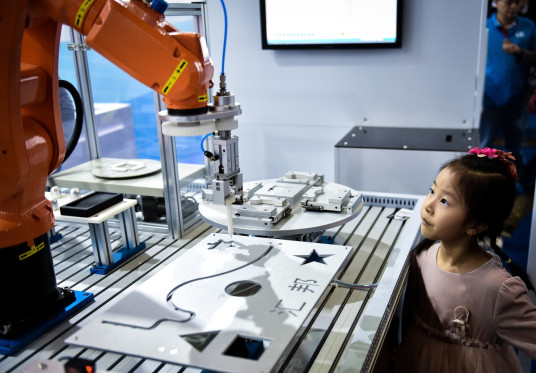Artificial intelligence developing rapidly across the country
 |
|
A girl watches an AI-supported robot arm making a billboard during a high-tech exhibition in Shenzhen, Guangdong province. [Photo/Xinhua] |
Artificial intelligence is developing vigorously in China with tech companies across the country teaming up to marry the technology with a variety of industries, a top industry official said.
"China's AI industry is flourishing currently, epitomized by the fact that an increasing number of tech breakthroughs are being made. AI is also being applied in a string of vertical industries," said Chen Zhaoxiong, vice-minister of industry and information technology.
Chen said that AI will have an impact on the internet and companies should firmly grasp the historic opportunities to make technological innovations.
"More efforts are needed to further integrate AI, big data, and the internet with the real economy to boost new economic drivers," he added.
Chen made the remarks at the first China Artificial Intelligence Summit held in Xiamen, in East China's Fujian province, which saw the participation of over 2,000 leading experts and entrepreneurs from the AI industry.
Hu Changsheng, Party secretary of Xiamen, noted that the city aims to become a "Silicon Valley of AI" to accelerate the high-quality development of the technology in the country.
The city's determination reflects China's broader efforts to implement an AI development plan that aims to build a 1 trillion yuan ($146 billion) AI core industry by 2030.The plan is expected to stimulate related business to the tune of 10 trillion yuan.
During the process, AI will be commercialized in different industries including next-generation network security, robotics, blockchain, the internet of things, 3D printing and virtual reality.
Local blockchain firm Lianren, for instance, has leveraged advanced technologies such as AI and blockchain to enable users to conduct e-commerce through livestreaming and short videos.
The company said it has raised $30 million in its latest round of financing and will leverage blockchain technology to speed up the digitalization of the local government administration process in Fujian.
"National-level policies, extensive application data, rich application scenarios and the accumulation of young talents are four unique advantages of China's AI industry," said Gao Wen, an academician at the Chinese Academy of Engineering.
The high-tech push is also expected to be accelerated since the country is launching superfast 5G technology in the communications industry.
"5G will enable data transfers at speeds much faster than 4G, meaning that it could quickly gather data. It will improve the efficiency of AI," said Yang Kun, an expert at the China Academy of Information and Communications Technology, a research institute based in Beijing.
However, Xue Lan, dean of Schwarzman College at Tsinghua University and chairman of the committee, pointed out that AI has raised a string of new challenges.
"Increasing bottlenecks including data privacy, machine ethics, safety, risks and misuse of spreading misinformation remain to be tackled," Xue said.

